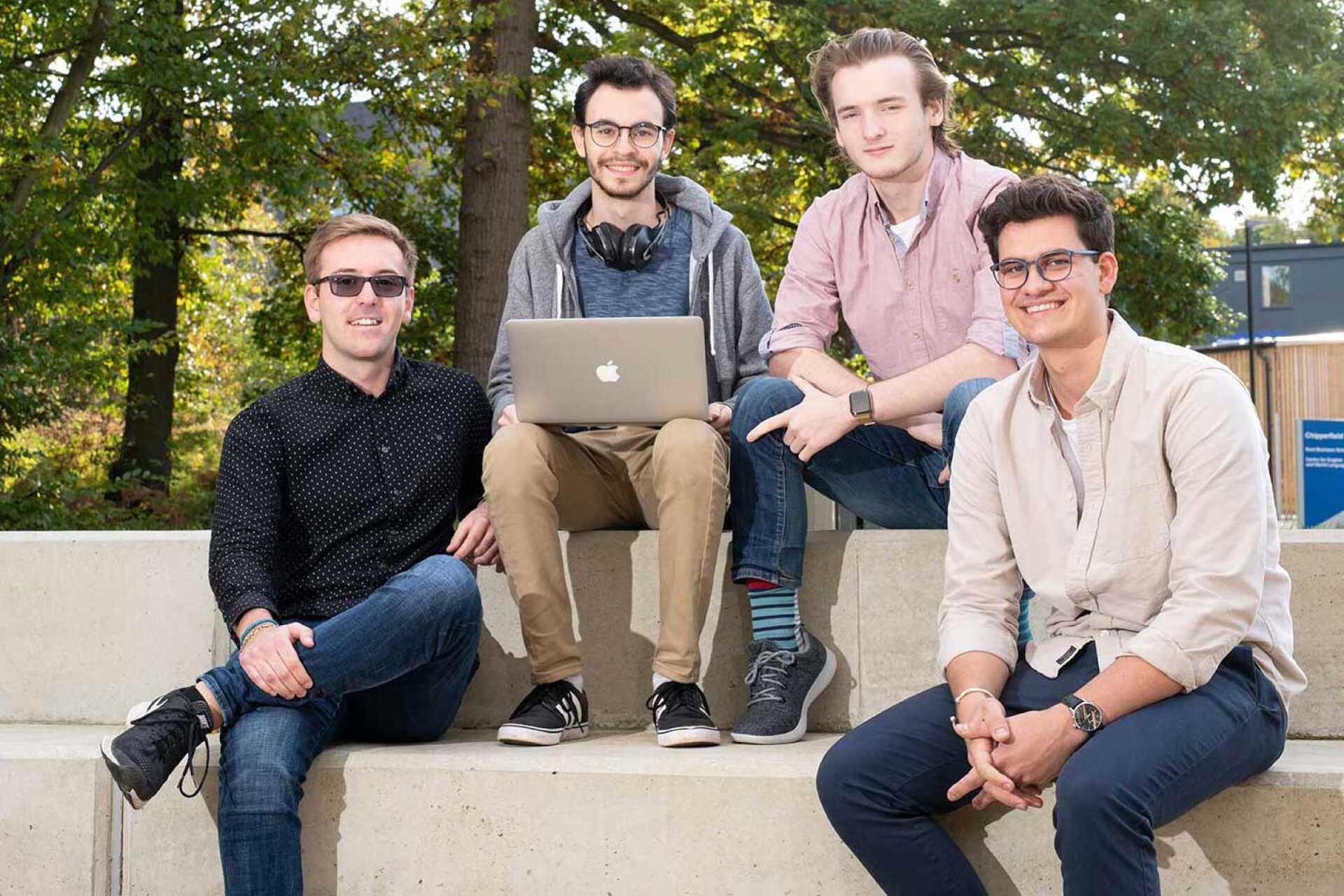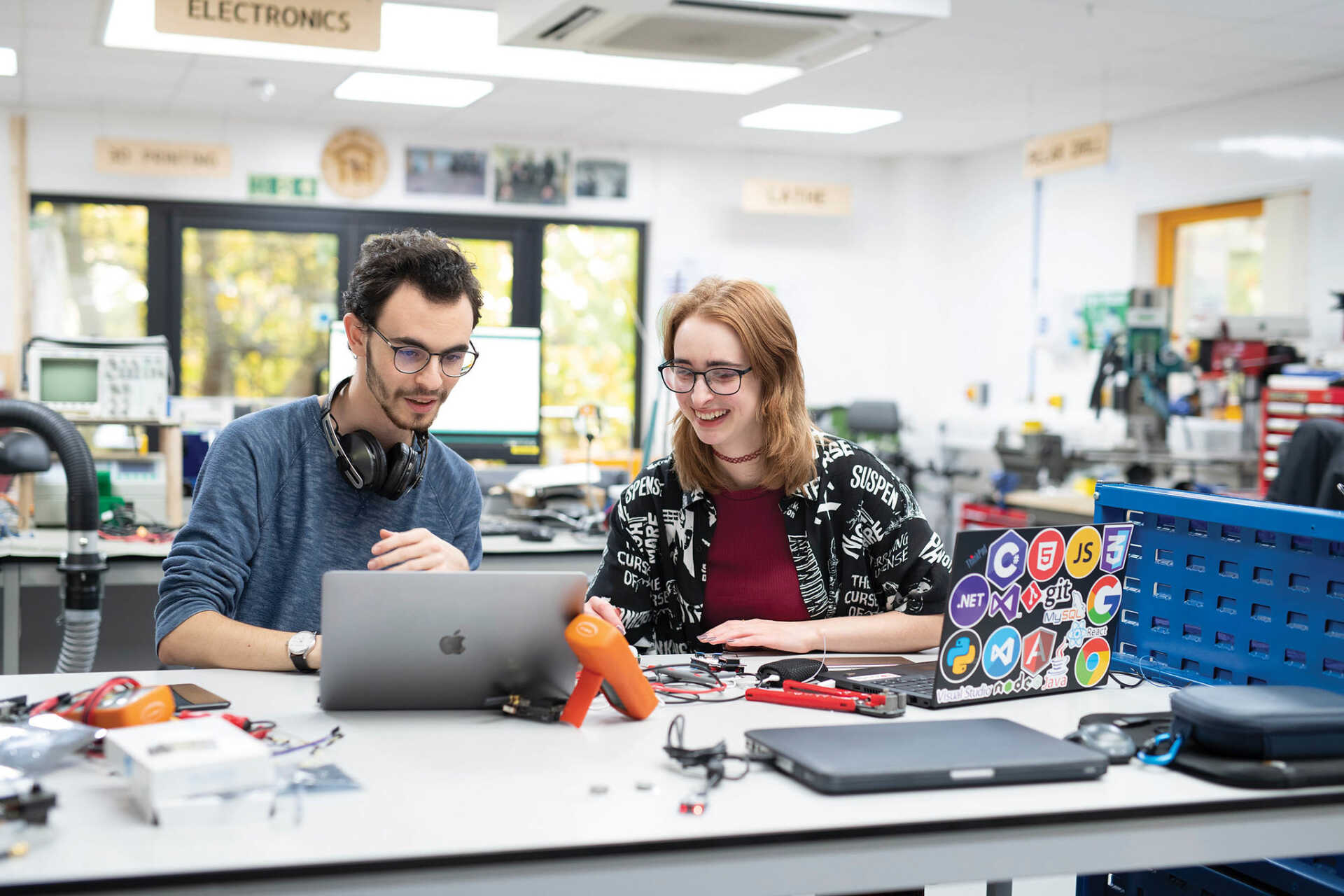Business Information Technology
with a Year in Industry
Combine expertise from the School of Computing and Kent Business School to start your journey to a well paid career.

Combine expertise from the School of Computing and Kent Business School to start your journey to a well paid career.
Think you've found the right course? We still have spots available through Clearing. Apply now to secure your place and join our dynamic and welcoming community at Kent this September.
Apply nowBusiness increasingly takes place in digital spaces. Our Business Information Technology degree gives you the skills you need to apply computing knowledge to areas typically found in business such as e-commerce, information systems and computer consultancy.
Business and commerce need a skilled workforce who understand the foundations of information technology and the principles of business practice. This degree provides a balance of business and information technology and responds to industry needs, enhancing your employment prospects.
Over half our students choose to take a year in industry after the second year of the programme. This gives you work experience, a salary and the possibility of a job with the same company after graduation.

"The School of Computing manages everything to do with the year in industry, and how much support they give you."
Accredited by BCS, The Chartered Institute for IT

Choose to add an industry placement, giving you work experience, a salary and the chance to secure a job with the same company after graduation.
Informed by stakeholder panel of industry experts who give feedback on the skills employers need from a modern workforce.

You’ll have access to a laser cutter, metal fabrication machinery and development equipment.
At Kent, you’re more than your grades. We look at each student’s circumstances as a whole before deciding whether to make an offer to study here. We also take this flexible approach when we receive your exam results. Some courses may prefer your qualifications to include specific subjects, which will be listed below if required.
Check our Clearing vacancy list or call us now +44 (0)1227 768896 to find out if we have a course that’s right for you. See our Clearing website for more details on how Clearing works at Kent.
The following modules are offered to our current students. This listing is based on the current curriculum and may change year to year in response to new curriculum developments and innovation:
What are the best ways to manage people in organisations? How are decisions made about the design of work, the structure of an organisation, and who is accountable or responsible for different activities? What are the best ways to manage people in organisations? How are decisions made about the design of work, the structure of an organisation, and who is accountable or responsible for different activities? You'll understand the practices of contemporary organisations by looking at a wide range of different theories of management, starting with classical management perspectives like scientific management or human relations theory and then considering more contemporary issues like culture management and leadership styles. Using case studies, you’ll develop key skills like critical thinking and be able to reflect on the ethics and fairness of contemporary forms of work.
The module is designed to teach students how to prepare, read and interpret financial information with a view to their being future business managers rather than accountants.
The module will begin with a brief demonstration of bookkeeping using an easy understandable approach. Students will be shown how to prepare financial statements from a trial balance and make adjustments to the figures given by acting on information given in a short scenario.
The regulatory framework of financial reporting will be considered with annual reports and accounts of a variety of organisations. The module will end with an analysis of financial statements with students shown how to interpret data and make sensible recommendations.
This module provides an introduction to object-oriented software development. Software pervades many aspects of most professional fields and sciences, and an understanding of the development of software applications is useful as a basis for many disciplines. This module covers the development of simple software systems. Students will gain an understanding of the software development process, and learn to design and implement applications in a popular object-oriented programming language. Fundamentals of classes and objects are introduced and key features of class descriptions: constructors, methods and fields. Method implementation through assignment, selection control structures, iterative control structures and other statements is introduced. Collection objects are also covered and the availability of library classes as building blocks. Throughout the course, the quality of class design and the need for a professional approach to software development is emphasised and forms part of the assessment criteria.
Mathematical reasoning underpins many aspects of computer science and this module aims to provide the skills needed for other modules on the degree programme; we are not teaching mathematics for its own sake. Topics will include algebra, reasoning and proof, set theory, functions, statistics and computer arithmetic.
An introduction to databases and SQL, focussing on their use as a source for content for websites. Creating static content for websites using HTML(5) and controlling their appearance using CSS. Using PHP to integrate static and dynamic content for web sites. Securing dynamic websites. Using Javascript to improve interactivity and maintainability in web content.
This module provides an introduction to human-computer interaction. Fundamental aspects of human physiology and psychology are introduced and key features of interaction and common interaction styles delineated. A variety of analysis and design methods are introduced (e.g. GOMS. heuristic evaluation, user-centred and contextual design techniques). Throughout the course, the quality of design and the need for a professional, integrated and user-centred approach to interface development is emphasised. Rapid and low-fidelity prototyping feature as one aspect of this.
This module equips students with an understanding of how modern cloud-based applications work. Topics covered may include:
• A high-level view of cloud computing: the economies of scale, security issues, ethical concerns, the typical high-level architecture of a cloud-based application, types of available services (e.g., parallelization, data storage).
• Cloud infrastructure: command line interface; containers and virtual machines; parallelization (e.g., MapReduce, distributed graph processing); data storage (e.g., distributed file systems, distributed databases, distributed shared in-memory data structures).
• Cloud concepts: high-level races, transactions and sequential equivalence; classical distributed algorithms (e.g., election, global snapshot, consensus, distributed mutual exclusion); scheduling, fault-tolerance and reliability in the context of a particular parallelization technology (e.g., MapReduce).
• Operating system support: network services (e.g., TCP/IP, routing, reliable communication), virtualization services (e.g., virtual memory, containers)
This module builds on the foundation of object-oriented design and implementation found in CO320 to provide both a broader and a deeper understanding of and facility with object-oriented program design and implementation. Reinforcement of foundational material is through its use in both understanding and working with a range of fundamental data structures and algorithms. More advanced features of object-orientation, such as interface inheritance, abstract classes, nested classes, functional abstractions and exceptions are covered. These allow an application-level view of design and implementation to be explored. Throughout the course, the quality of application design and the need for a professional approach to software development is emphasised.

It was a change to work in the real world, and I think it helps you to see what you want in life.Eleana Sklaveniti, Computer Science with a Year in Industry - BSc (Hons)
Embrace entrepreneurship to catapult your vision into reality in a fast-paced and ever-evolving business environment. This module centred on the dynamics of innovation in business, equips you with ideation and effective implementation skills crucial for both startups and established firms. You'll learn strategic planning and gain entrepreneurial skill development as you tackle business challenges innovatively and confidently. You’ll explore market analysis, team management, strategic decision-making, financial planning, investor relations and the creation of effective business models as you develop a comprehensive business plan. This module bridges the gap between ambition and reality, whether you plan to initiate a new venture or enhance an existing organisation.
Profit planning is crucial in achieving sustainability and growth for business, especially in a global marketplace. In management, decisions have to be made daily, and financial controls are key to making them. By giving you the chance to apply financial controls to make a variety of short and long-term decisions and the opportunity to create a profit plan combining all the key considerations needed in business – you'll make rapid progress and gain crucial experience. This means when you step into your career, you’ll be ready to make a real impact and deliver results.
Project managers are in the driving seat of progress in every field, across every region of the world. Master the fundamental concepts of project management that form the backbone of any successful innovation, invention or business process improvement. You'll understand the tools and techniques required in the modern world to deliver successful projects, drive profits and build better business.
This module covers the basic principles of machine learning and the kinds of problems that can be solved by such techniques. You learn about the philosophy of AI, how knowledge is represented and algorithms to search state spaces. The module also provides an introduction to both machine learning and biologically inspired computation.
This module provides an introduction to the theory and practice of database systems. It extends the study of information systems in Stage 1 by focusing on the design, implementation and use of database systems. Topics include database management systems architecture, data modelling and database design, query languages, recent developments and future prospects.
Building scaleable web sites using client-side and server-side frameworks (e.g. JQuery, CodeIgniter). Data transfer technologies, e.g. XML and JSON. Building highly interactive web sites using e.g. AJAX. Web services. Deploying applications and services to the web: servers, infrastructure services, and traffic and performance analysis. Web and application development for mobile devices.
This module aims to provide students with an understanding of the fundamental components (hardware and software) of a typical computer system, and how they collaborate to execute software programs. The module provides a compressive overview from the lowest level of abstractions in hardware to the highest level of abstractions of modern programming languages. For example, they will see logic circuits, machine language, programming language implementations, high-level languages, and applications. This material provides a general understanding of computers, and it will also prepare students to develop software considering the system perspective, e.g. cost of abstraction and performance implications.
The module studies team-based Agile software development in detail and places it in a wider software development context.
Topics covered include
• Concepts, principles, practice and philosophy of an Agile approach to software development, contrasting with more structured approaches.
• Collaboration: programmer collaboration, team values, customer involvement, project management, standards and reporting.
• Planning: release and sprint planning, risk assessment, user stories and resource estimating
• Development practices: incremental requirements, test-driven development, refactoring, scrum, code review, quality assurance, continuous integration.
• Tools: IDEs, version control, automated code quality evaluation, issue tracking.
• Ethics, Intellectual property, codes of conduct and professional responsibility.
You spend a year working in an industrial or commercial environment between Stages 2 and 3.
Our students go to a wide range of companies including:
They have also been to overseas employers in locations including Amsterdam, Hong Kong and the US.
The year in industry forms an integral part of your degree and constitutes 10% of your final grade. Assessment comprises an employer evaluation, a reflective report and a logbook/portfolio.
Although it is your responsibility to find a suitable placement, the dedicated placement team will help to identify suitable opportunities, assist with your application and prepare you for interviews.
To automatically progress onto the year in industry, you must pass Stage 2 at the first attempt. If you fail, you must pass the first resit opportunity in the August of the same year. Students who do not obtain a work placement will have their registration changed to the equivalent three-year programme without a year in industry.
Students spend a year (minimum 44 weeks) working in an industrial or commercial setting, applying and enhancing the skills and techniques they have developed and studied in the earlier stages of their degree programme. The work they do is entirely under the direction of their industrial supervisor, but support is provided via a dedicated Placement Support Officer with the School. This support includes ensuring that the work they are being expected to do is such that they can meet the learning outcomes of the module.
Students spend a year (minimum 44 weeks) usually in an industrial, commercial, public sector, or similar setting, applying and enhancing the skills and techniques they have developed and studied in the earlier stages of their degree course.
The Assessments required for this module should provide evidence of the subject specific and generic learning outcomes, and of reflection by the student on them as an independent learner.
The placement work they do is entirely under the direction of their industrial supervisor, but support is provided by the University. This support includes ensuring that the work they are being expected to do is such that they can meet the learning outcomes of this module.
Participation in the placement year, and hence in this module, is dependent on students obtaining an appropriate placement, for which support and guidance is provided by the University. It is also dependent on students progressing satisfactorily from Stage 2 of their studies.
Students who do not obtain a placement will be required to transfer to the appropriate course without a Year in Industry.
Packet data networks, overview of general equipment and function (e.g. hubs, switches, routers). Large network architecture (e.g. the Internet).
The OSI Seven layer model and packet encapsulation.
An understanding and appreciation for physical issues (such as cabling and wireless mediums, bandwidth, interference, etc).
Data-link layer issues (e.g. IEEE 802.3, IEEE 802.11, collisions, retransmissions, error recovery)
Network layer issues covering underlying protocols (e.g. IPv4/IPv6) and routing protocols (e.g. RIP/OSPF/AODV)
Transport layer issues and protocols (e.g. TCP/UDP)
Session layer issues and protocols (e.g. TCP).
Presentation layer overview
Application layer protocols (e.g. DNS, HTTP, FTP, SMTP/POP3)
Students, working in small groups, undertake a project related to computer science and/or software engineering. The project may be self-proposed or may be selected from a list of project proposals. A project will involve the specification, design, implementation, documentation and demonstration of a technical artefact, demonstrating the ability to synthesise information, ideas and practices to provide a quality solution together with an evaluation of that solution.
Students will be expected to develop the ability to use appropriate techniques of analysis and enquiry within Operations and Service Management and to learn how to evaluate the alternatives and make recommendations. Topics include: • The nature of services and service strategy • Service development and technology • Service quality and the service encounter • Project/Event management and control • Managing capacity and demand in services • Managing inventories
The aim of this module is to provide students with in-depth knowledge about the accounting and control systems businesses use for making managerial decisions. In particular, the module focuses on profit planning decisions and it gives students a thoughtful understanding of the functioning and range of financial controls managers use for making profit planning decisions, related to both the business as a whole and its segments. Students are expected to conduct a management project: they will prepare a business plan that takes into account strategic, marketing and financial aspects. The module also enables students to know how to use accounting and control tools to assess business performance, provide feedback and give recommendations for improvements aimed to create more socially responsible and sustainable businesses. As such, this module is core to the degree program, because it gives an introduction to three key areas: managerial decision making, performance management and organisational financial management.
This module will explore more advanced management and organisational theory to facilitate students' examination of the challenges that face managers in contemporary organisations. As well as considering these challenges from a mainstream managerial perspective, the module will also draw on the perspective of critical management studies as a means of providing an alternative viewpoint on contemporary management issues. Indicative areas to be covered may include:
• Identity in organisations and how the construction and performance of it requires managers to cope with existential challenges around anxiety and freedom.
• The uses and abuses of managerial power and the inequality and insecurity that comes with it.
• Neoliberal capitalism and its various consequences for organisational life.
• Pressures to make organisations more sustainable, socially responsible, equal, diverse, and fair.
• Organisational cultures based on entrepreneurialism.
• The performance of gender in organisations.
• New organisational forms and their emphasis on Speed.
• The intensification of the control of Bodies, Spaces, and Time in contemporary organisations.
This module presents an overview of what work psychology is and its relevance and usefulness in improving our understanding and management of people (including ourselves) at work. Many work places operate sophisticated and expensive systems for assessing the costs and benefits of various workplace elements but often do not extend this to the management of employees. This module aims to demonstrate the benefits of having a comprehensive understanding of the role psychology can play in the management of people in contemporary organizations. Indicative content includes:
• Work psychology
• Individual differences and psychometrics
• Best practice personnel selection
• Stress and well-being
• Motivation
• Stereotypes and group behaviour
• Leadership and diversity
• The dark side of personality
• Political behaviour in the workplace
• The psychology of entrepreneurs
• Using work psychology to enhance employability
The aim of this module is to provide students with (1) a systematic understanding of how information technology is driving business innovation, (2) the methods and approaches used by managers to exploit new digital opportunities, and (3) an appreciation of the knowledge and skills needed to manage the business innovation. By the end of this module, students will be equipped with the necessary knowledge and tools to deal with current business issues including digital transformation and emerging business models via technological innovations.
This module will introduce students to the key concepts of managing people involving and examination of organisational, management and human resource management theory and practice. This will be achieved through relating relevant theory to practical people and organisational management issues. The key topics of the module are: • The nature of human resource management • Motivation in the workplace • Work organisation, job design and flexible working • Groups and team working • Diversity in the workplace • Recruitment & selection • Learning and development • Employee Involvement and participation • Employee performance and reward • Ethical HRM
The module aims to provide a critical understanding of the challenges of managing creativity and innovation within contemporary organisations. The experience of work and employment, management practices are affected by rapid technological change, intensifying global competition and changing demographic profiles and values of the work force. Contemporary organisations are pressurised to tackle these developments through creativity, innovation and new organisational forms. This module examines the nature, antecedents, processes and consequences of creativity and innovation and their complex links with organisation, while also exploring major social and technological changes relating these to organisational creativity and innovation. Students will be introduced to the main concepts and theories on creativity, innovation and organisation through readings and discussions of the main themes and debates in the field. Case studies will be used to illustrate how these concepts are connected together and how they could impact upon management decision making within contemporary organisations. Students will be encouraged to explore some of the most notable historical and contemporary shifts in media and technology and discover how new organisational forms and methods have been devised to exploit them. They will develop awareness for the cross-fertilisation between disciplines in analyzing the dynamics of creativity, innovation and organisation and their complex relationships. Topics include: • Conceptual foundations of creativity, innovation and organisation • Personality and individual creativity • Organisational creativity and innovation • Cognition, knowledge and creativity • Models and processes of innovation • Organisational culture and systems for supporting creativity and innovation • Leadership and entrepreneurship • Creative organisations across fields/ industries • Socio-technological change and new forms of organisation.
Business ethics and sustainability are central to contemporary management and thus this module will explore the following topics: • History, definitions and timeline of society's view on business ethics and sustainability • Cross-disciplinary approaches to ethics and sustainability • Role of globalisation, policy and culture • Ethics and ethical dilemmas • Change Management, Values, Governance and Leadership • Sustainable Business Models • Social Innovation • Partnerships and collaboration • Responsible Supply Chain Management • Environmental Assessment Frameworks and Sustainable Management in practice • Sustainable Supply Chain Management • Innovation and creativity • The role and responses of Corporations, SMEs, Public and not-for-profit organisations
Students will be expected to develop the ability to use appropriate techniques of analysis and enquiry within Operations Management and to learn how to evaluate alternatives and make recommendations. Topics are likely to include: • Strategic role of operations and operations strategy • Design of processes and the implications for layout and flow • Design and management of supply networks in national and international contexts • Resource planning and management • Lean systems • Quality planning and managing improvement
This module facilitates the development of an entrepreneurial mind-set, and equips students with necessary cutting-edge knowledge and skills vital for generating value in a knowledge based economy. The curriculum will include the following areas of study: • Broader application of entrepreneurship • Co-creation as a new form of generating value in an innovation ecosystem. • Managing innovation entrepreneurially • Entrepreneurial opportunity • Entrepreneurial Motivation • Entrepreneurial Marketing • Entrepreneurial Finance – Finance fuels entrepreneurship.
In this module you learn what is meant by neural networks and how to explain the mathematical equations that underlie them. You also build neural networks using state of the art simulation technology and apply these networks to the solution of problems. In addition, the module discusses examples of computation applied to neurobiology and cognitive psychology.
Indicative topics include:
• Resource Description Framework (RDF) & RDF Schema:
• Information representation and knowledge exchange on the web
o Applications of RDF
• RDF Query and Inference Languages (e.g. SPARQL etc.)
• Web Ontology Language (OWL):
o Publishing and sharing of ontologies
• Knowledge management, asset management, enterprise integration
o Automated agents
• Existing Shared Ontologies (e.g. FOAF, DC, SKOS etc.)
• Metadata and Provenance
• The Wider Picture:
o Data trust and proof issues
o Computer law and professional issues
• The future of the Web (these lists are not exhaustive):
o Web 3.0: the Semantic Web; cognitive architecture; automated reasoning; distributed computing; composite applications; semantic wikis etc.
• Aim to give students the tools to critically evaluate the Semantic Web (and alternative proposals)
Students will spend one half-day per week for ten weeks in a school with a nominated teacher. They will observe sessions taught by their designated teacher and possibly other teachers. Later they will act somewhat in the role of a teaching assistant, by helping individual pupils who are having difficulties or by working with small groups. They may take 'hotspots': brief sessions with the whole class where they explain a technical topic or talk about aspects of university life. They must keep a weekly log of their activities. Each student must also devise a special project in consultation with the teacher and with the module convener. They must then implement and evaluate the project.
The following is indicative of topics/themes this module will include:
• An overview of basic concepts related to Computational Intelligence (CI) techniques, such as heuristic search and optimisation
• Presentation of different CI algorithms, such as hill climbing, simulated annealing, genetic algorithms and genetic programming
• An overview of basic concepts related to real-world problems related to business, economics and finance, such as financial forecasting, automated bargaining, portfolio
optimisation, and timetabling
• The use of Computational Intelligence techniques to solve real-world problems
• Computational Intelligence decision support systems and software wind tunnels for testing new markets and strategies
The module aim is to give students an overview and understanding of key theoretical, practical and philosophical research and issues around computational creativity, and to give them practical experience in writing and evaluating creative software.
The following is an indicative list of topics that may be covered:
• Introduction to computational creativity
• Examples of computational creativity software e.g. musical systems, artistic systems, linguistic systems, proof generator systems, systems for 2D and 3D design.
• Evaluation of computational creativity systems (both of the quality and the creativity of systems)
• Philosophical issues concerning creativity in computers
• Comparison of computer creativity to human creativity
• Collaborative creativity between humans and computers
• Overview of recent research directions/results in computational creativity
• Practical experience in writing creative software.
This module will provide the student with an understanding of basic principles of signals; introduce digitisation methods such as sampling, quantisation and coding; describe and apply signal analysis techniques, such as segmentation, noise reduction, filtering, spectral analysis, feature extraction and classification (including recognition and decision making) to solve practical signal analysis problems using Matlab.
An overview of basic concepts related to eHealth and a perspective on current HIT (Health Information Technology) and innovation. Review of current healthcare related IT systems. The use of information technology for handling clinical data, health systems. Data representation and knowledge management. Security and privacy. Ethics and legal requirements of eHealth systems. Clinical decision support systems. TeleHealth tools for remote diagnosis, monitoring, and disease management. Delivery and monitoring platforms for both hospitals and home environment. Innovation in eHealth systems leading to start-up companies.
This module explores a range of different data mining and knowledge discovery techniques and algorithms. You learn about the strengths and weaknesses of different techniques and how to choose the most appropriate for any particular task. You use a data mining tool, and learn to evaluate the quality of discovered knowledge.
This module is concerned with a range of topics in video game design and development, including game physics, AI, level design, player behaviour, game rules and mechanics, as well as user interfaces. This module introduces students to game development using industry-standard software tools.
Within the School of Computing are authors of widely used textbooks. Programmes are taught by leading researchers who are experts in their fields.
Teaching is based on lectures, with practical classes and seminars, but we are also introducing more innovative ways of teaching, such as virtual learning environments and work-based tuition. Work includes group projects, case studies and computer simulations, with a large-scale project of your own choice in the final year.
Each stage comprises eight modules. Most modules run for a single 12-week term. Each module has two lectures and one to two hours of classes, usually making 14 formal contact hours per week and eight hours of 'homework club' drop-in sessions each term.
We provide excellent support for you throughout your time at Kent. This includes access to web-based information systems, podcasts and web forums for students who can benefit from extra help. We use innovative teaching methodologies, including BlueJ and LEGO© Mindstorms for teaching Java programming.
Our staff have written internationally acclaimed textbooks for learning programming, which have been translated into eight languages and are used worldwide.
Assessment is by a combination of coursework and end-of-year examination and details are shown in the module outlines on the web. Project modules are assessed wholly by coursework.
The marks from stage one do not go towards your final degree grade, but you must pass to continue to stage two.
Most stage two modules are assessed by coursework and end-of-year examination. Marks from stage two count towards your degree result. You must pass stage two to go on your year in industry.
The year in industry forms an integral part of your degree and constitutes 10% of your final grade. Assessment comprises an employer evaluation, a reflective report and a logbook/portfolio.
Most stage three modules are assessed by a combination of coursework and end-of-year examination. Projects are assessed by your contribution to the final project, the final report, and oral presentation and viva examination. Marks from stage three count towards your degree result.
In stage three your project counts for 25% of the year's marks.
For a student studying full time, each academic year of the programme will comprise 1200 learning hours which include both direct contact hours and private study hours. The precise breakdown of hours will be subject dependent and will vary according to modules.
Methods of assessment will vary according to subject specialism and individual modules.
Please refer to the individual module details under Course Structure.
For programme aims and learning outcomes please see the programme specification.
You'll be on course for a big future. Graduates who have both IT knowledge and business skills can expect excellent career prospects. Our graduates have gone on to work in:
Recent graduates have gone on to develop successful careers at leading companies such as:

The 2024/25 annual tuition fees for this course are:
For details of when and how to pay fees and charges, please see our Student Finance Guide.
For students continuing on this programme, fees will increase year on year by no more than RPI + 3% in each academic year of study except where regulated.*
The University will assess your fee status as part of the application process. If you are uncertain about your fee status you may wish to seek advice from UKCISA before applying.
Fees for undergraduate students are £1,850.
Fees for undergraduate students are £1,385.
Students studying abroad for less than one academic year will pay full fees according to their fee status.
Find out more about accommodation and living costs, plus general additional costs that you may pay when studying at Kent.
Kent offers generous financial support schemes to assist eligible undergraduate students during their studies. See our funding page for more details.

We have a range of subject-specific awards and scholarships for academic, sporting and musical achievement.
Student Life

In the QS World University Rankings 2024, Kent has been ranked 39th within the UK and is in the top 25% of Higher Education Institutions worldwide.
Kent Sport
Kent has risen 11 places in THE’s REF 2021 ranking, confirming us as a leading research university.

An unmissable part of your student experience.